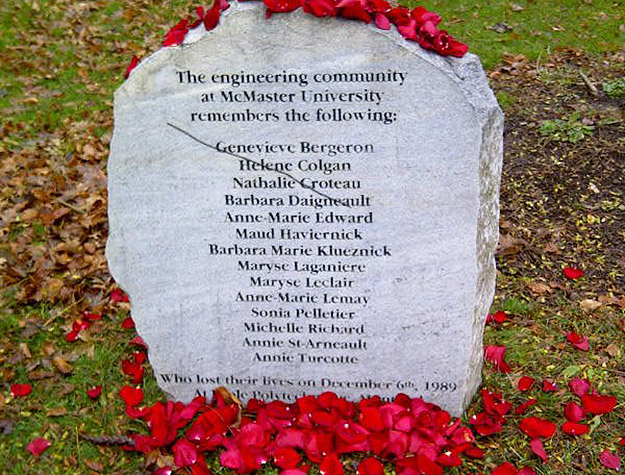A voice for the voiceless

A memorial stone in front of the John Hodgins Engineering Building lists the names of 14 victims from the 1989 shooting at Montreal's École Polytechnique. A memorial service will be held Thursday in Council Chambers to address violence against women.
In the late-afternoon hours of Dec. 6, 1989, Carol Wood was wrapping up another busy day at the Villa International guesthouse in Atlanta, Georgia, where she worked as co-director.
More than 1,200 miles away, on a quiet university campus just north of downtown Montreal, Marc Lépine was preparing to open fire on unsuspecting engineering students, killing 14 women and injuring 14 more. The tragedy at École Polytechnique came to be known as the “Montreal Massacre,” and brought misogyny and violence against women to the forefront of the Canadian consciousness.
The emotional and physical distance made no difference. Wood has never been able to comprehend what happened that day.
“It was sort of a watershed moment in Canadian history,” says McMaster’s longtime ecumenical chaplain. “It’s become a day of remembrance, but it’s also a call to action. There are thousands of women across Canada who have lost their lives to violence.”
On Thursday afternoon, the McMaster Anti-Violence Network will commemorate the events at École Polytechnique with a memorial service in Council Chambers. Wood, who helped launch the AVN in 1997, says the ceremony is an important reminder for a whole new generation of students – many of whom weren’t even born when the attack took place.
“This isn’t just a women’s issue,” says Wood. “It’s important to educate younger generations of both men and women. We all need to work together to make a safer culture.”
Thursday’s event will feature the reading of 14 victims’ names from École Polytechnique, along with the names of five women from McMaster and many Aboriginal women who died as a result of violence. Ontario Minister of Education and McMaster alumna Laurel Broten will participate in the official proceedings, along with Norma General of Sisters in Spirit.
Two years after the attack in Montreal, the Government of Canada declared Dec. 6 to be National Day of Remembrance & Action on Violence Against Women, commonly referred to as “White Ribbon Day.” Since the mid-1990s, McMaster has paid tribute to the victims of violence in a variety of ways.
In September, 1993, the Nina de Villiers Garden was opened in front of Convocation Hall. Twenty-year-old de Villiers was a student at McMaster when she was abducted and killed by a violent offender while jogging in Burlington two years prior. The solemn garden is place to reflect on Nina’s memory, but also stands as a symbol of peace, compassion and understanding. A plaque in centre of the garden reads: “as the garden renews itself, let it remind us of what we can do to make the world a better place.”
Nina’s mother, activist Priscilla de Villiers, received an honorary doctorate from the University in 1995 thanks in large part to her founding of the anti-violence charity CAVEAT. Priscilla spoke to the the Daily News in 2007 regarding the impact of her organization. “The goal was modest, to save one life … The difficult thing about prevention is that you don’t know how many lives you’ve saved.”
Her daughter Nina would have been 41 this year. Following Thursday’s ceremony in Council Chambers, attendees will walk to the garden that bears her name, where they’ll scatter rose petals.
All members of the campus community are invited to attend Thursday’s ceremony, which begins at 2 p.m. For more information, email Carol Wood at woodcar@mcmaster.ca.
Members of the Anti-Violence Network will also be in the MUSC Marketplace on Tuesday, Dec. 4, collecting shoes to benefit women and children at Martha House, Mary House, Inasmuch, Interval House and the Native Women’s Centre. The shoe drive will take place between 11 a.m. and 2 p.m.
With files from Susan Bubak

